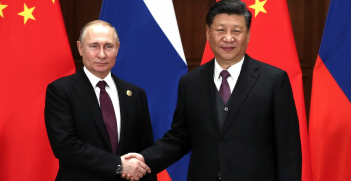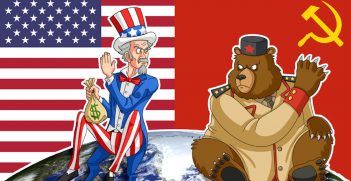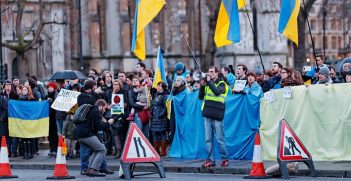War and the Weaponisation of Law against Russian Citizens

The weaponisation of law in Russia has been a long time coming, with the invasion of Ukraine a catalyst for the broader political and societal repression of Russia’s citizens. For the time being, this assault through law on rights and freedoms shows no signs of letting up.
When Russia invaded Ukraine on 24 February 2022 it opened the door for an assault not only on a neighboring nation, but also on all remaining traces of dissent in Russia. Most importantly, Russia has done all of this under the guise of law—passing new laws to suppress dissent, and creatively using laws already on the books. As in many authoritarian regimes, a combination of specifically targeted but vaguely written laws enables authorities to prosecute people engaged in all manner of activities that the state does not like.
New Anti-War Dissent Laws
Within eight days of the war’s start, two new laws were passed, one making “discrediting the military” a fineable offense and a second making dissemination of “knowingly false information” about the Russian military criminal. Later amendments to the law also made it illegal to discredit or spread knowingly false information about Russian state agencies operating abroad and anyone assisting the military in its assigned tasks, which covers private military contractors like the Wagner Group.
Over a year into the war, there have been 6,839 cases of discrediting, over half within the first 4 months of the war. People have discredited the military, according to law enforcement, through various activities—holding an anti-war sign, wearing blue and yellow clothing, having private conversations about the war, handing out flyers, signing online petitions, complimenting Ukrainian President Volodymyr Zelenskyy’s good looks, or most frequently, posting, reposting, and liking or sharing anti-war content on social media. Two discrediting offenses within a year can result in a criminal charge of repeat discrediting, punishable by up to three years in prison—80 have been opened so far.
There have also been 168 criminal cases for spreading “knowingly false information.” These charges have not only impacted those accused, but also what was left of Russian independent media. Almost immediately after the passage of these laws, dozens of media outlets shut their doors, fearing that their journalists could be subject to criminal charges for simply reporting the truth about the war, rather than repeating the Ministry of Defense’s official line that, for example, Russia was hitting only military targets in Ukraine and not civilians.
Social media posts are a prime target for law enforcement in bringing to court both of these types of charges. But they have also been the result of reporting by “patriotic” citizens. As the war has dragged on, sentences for disseminating “knowingly false information” have become increasingly harsh, with people receiving more prison terms rather than non-custodial sentences in comparison with the first year of the war.
Though these laws are most clearly directed at suppressing anti-war sentiment and activity, the Russian legal system has also used a bevy of other criminal code violations to charge people for their anti-war positions. These include charges for: rehabilitating Nazism, calling for extremist activity, using violence against a police officer, and terrorism, among others. Importantly, all of these laws are being applied not only to known critics of Vladimir Putin’s regime or opposition figures, but also to many ordinary citizens who criticise the war in public or private settings.
A Long Time Coming
Russia’s weaponisation of law against its own citizens has reached a fever pitch due to the war in Ukraine, but it did not begin there. Putin’s Russia has been laying the groundwork for legal repression for over a decade. Take, for example, the law on “foreign agents.” Originally passed in 2012, its stated aim was to increase “transparency” by identifying non-government organisations that engaged in “political activity,” loosely defined, and received foreign funding. It required registration—at first voluntary, and later unilaterally imposed by the Ministry of Justice—labelling all materials as produced by a “foreign agent,” and onerous quarterly reporting. Many organisations were forced to shut down, reorganise, find domestic sources of funding which were few and far between, or continue to accept foreign funding but remain stigmatised, overburdened with paperwork, and subject to inspection at any time. In 2020, eligibility for the list was expanded to include media organisations, individual journalists, ordinary citizens, and informal organisations. In December 2022, these registers were combined and a new category, “affiliate” of a foreign agent, was also added.
Failure to register as a foreign agent can result in fines to the tune of ₽RUB30,000-₽RUB50,000, with continued failure punishable by up to 5 years in prison. Failure to label materials, including social media posts, as produced by a foreign agent is punishable up to ₽RUB30,000. Failure to complete the required quarterly reports to the Ministry of Justice on time or completely can result in a ₽RUB30,000 to ₽RUB50,000 fine. These fines are significantly higher if a news media organisation violates them. Individuals labelled foreign agents cannot, among other things, run for political office, hold government positions, teach at public schools or universities, contract with the state, receive state funding, or do educational work with minors. The increase in newly labelled foreign agents during the war has been breathtaking—262 in the first 15 months. Books by foreign agents have been removed from library shelves, and “foreign agent” university professors have been fired from their jobs.
Now, Russia-watchers await every Friday’s release of the new additions—a list that already includes the Dalai Lama’s representative in Russia, many of Russia’s most popular musicians, entertainers, journalists and social media stars, almost all civil society activists, and even the World Wildlife Fund—to see who will be next. There is an ongoing discussion in the Russian parliament to amend this law to encompass even more people who have incidental contact with or support, knowingly or unknowingly, those labelled as foreign agents, and to limit foreign agents from earning any income in Russia. The process of systematic compilation of a list of perceived enemies enables continuous expansion and increased restrictions.
Likewise, Russia has used legal means to eliminate any form of street protest, leaving almost no legal options for Russians who wanted to publicly demonstrate their opposition to the war. After unexpectedly large protests in the winter of 2011-2012 after falsified parliamentary elections, the Kremlin began a slow but methodical crackdown on freedom of assembly. First it required that all protests receive prior authorisation, which few did. Then it made participating in an unauthorised protest a fineable offense, later adding the possibility of up to 30 days in jail. Potential fines increased from ₽RUB2,000 in 2012 to ₽RUB300,000 by 2021. Three or more violations within 180 days can turn into a criminal case. Regions throughout Russia have passed even more restrictive local-level versions of these laws.
During the COVID-19 pandemic, the Kremlin took advantage of public health restrictions to further limit public gatherings. By the time of the war’s start, the only form of legal street protest remaining, and only in some regions, was a single person holding a sign. Most of these protests are now assumed to be against the war and are charged with discrediting the Russian military. Despite these legal prohibitions and significant potential consequences—the average monthly salary in 2022 is ₽RUB57,000—people have still gone to the streets to express their opinion. There have been over 20,000 detentions for anti-war activities, mostly protests, since the start of the war.
In addition to foreign agents and protests, stories about the development and application of Russia’s system of legalised repression can be told about many other parts of Russian public life. In other words, by the time Russia invaded Ukraine, it took only a few legal tweaks and enthusiastic application by law enforcement to thoroughly weaponise the legal system against anti-war dissent.
Lauren A. McCarthy is Associate Professor of Legal Studies and Political Science, University of Massachusetts Amherst. Her research focuses on the relationship between law and society in Russia, police and law enforcement institutions, civilian oversight, and the issue of human trafficking. Her book Trafficking Justice: How Russian Police Use New Laws, from Crime to Courtroom was published by Cornell University Press.
This article is published under a Creative Commons License and may be republished with attribution.





